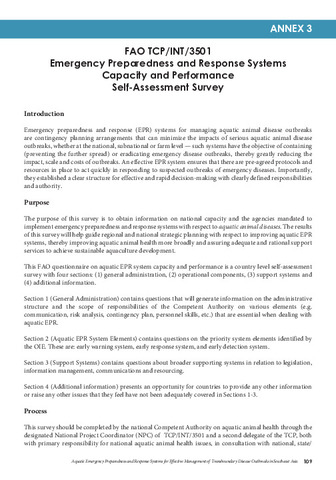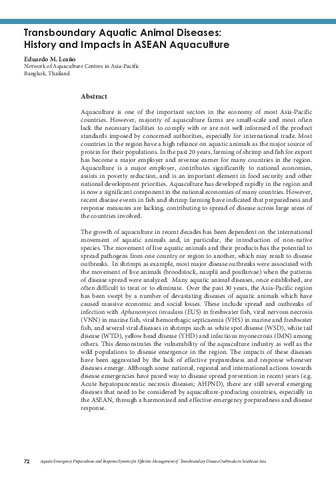FAO TCP/INT/3501: Emergency preparedness and response systems capacity and performance self-assessment survey
- Global styles
- MLA
- Vancouver
- Elsevier - Harvard
- APA
- Help

Date
2019Author
Page views
2,512ASFA keyword
disease control 
disease recognition
disease resistance
disease transmission
epidemiology
husbandry diseases
aquaculture regulations
quarantine regulations
fish culture
fish diseases
aquatic animals
risk management
response time
emergencies
government
surveying
aquaculture development
capacity development
animal diseases
aquaculture
sustainable aquaculture

disease recognition

disease resistance

disease transmission

epidemiology

husbandry diseases

aquaculture regulations

quarantine regulations

fish culture

fish diseases

aquatic animals

risk management

response time

emergencies

government

surveying

aquaculture development

capacity development

animal diseases

aquaculture

sustainable aquaculture

AGROVOC keyword
Metadata
Show full item record
Share
Abstract
The purpose of this survey is to obtain information on national capacity and the agencies mandated to implement emergency preparedness and response systems with respect to aquatic animal diseases. The results of this survey will help guide regional and national strategic planning with respect to improving aquatic EPR systems, thereby improving aquatic animal health more broadly and assuring adequate and rational support services to achieve sustainable aquaculture development.This FAO questionnaire on aquatic EPR system capacity and performance is a country level self-assessment survey with four sections: (1) general administration, (2) operational components, (3) support systems and (4) additional information.
Suggested Citation
FAO. (2019). FAO TCP/INT/3501: Emergency preparedness and response systems capacity and performance self-assessment survey. In E. A. Tendencia, L. D. de la Peña, & J. M. V. de la Cruz (Eds.), Aquatic Emergency Preparedness and Response Systems for Effective Management of Transboundary Disease Outbreaks in Southeast Asia: Proceedings of Asean Regional Technical Consultation, 20-22 August 2018, Centara Grand Central Ladprao, Bangkok, Thailand (pp. 109-115). Tigbauan, Iloilo, Philippines: Aquaculture Department, Southeast Asian Fisheries Development Center.
Type
Conference paperISBN
9789719931089
Related items
Showing items related by title, author, creator and subject.
-
Country status of aquatic emergency preparedness and response systems for effective management of aquatic animal disease outbreaks in Myanmar
Oo, Kyaw Naing; Cho, Yi Yi (Aquaculture Department, Southeast Asian Fisheries Development Center, 2019)Myanmar is one of the OIE members and the Department of Fisheries (DoF) is highly concerned with transboundary aquatic animal pathogens. Therefore, the Aquatic Animal Health & Disease Control Section has already been ... -
Transboundary aquatic animal diseases: History and impacts in ASEAN aquaculture
Leaño, Eduardo M. (Aquaculture Department, Southeast Asian Fisheries Development Center, 2019)Aquaculture is one of the important sectors in the economy of most Asia-Pacific countries. However, majority of aquaculture farms are small-scale and most often lack the necessary facilities to comply with or are not well ... -
Emergency response to emerging diseases: TiLV in tilapia
Senapin, Saengchan (Aquaculture Department, Southeast Asian Fisheries Development Center, 2019)Tilapia lake virus (TiLV) is a novel RNA virus resembling Orthomyxovirus. It has been recently re-classified to Tilapia tilapinevirus species, under Tilapinevirus genus, Amnoonviridae family (ICTV, 2018). Since the first ...




